By now pretty much every PC gamer knows GOG.com. Once home to only classic titles while still under the name Good Old Games, they’ve since expanded to newer games as well as being a central source of many excellent indie releases. I caught up with GOG.com’s Senior PR Manager Lukasz Kukawski to discuss the platform’s journey from its early release in 2008, to the champion of DRM-free digital distribution it is today.
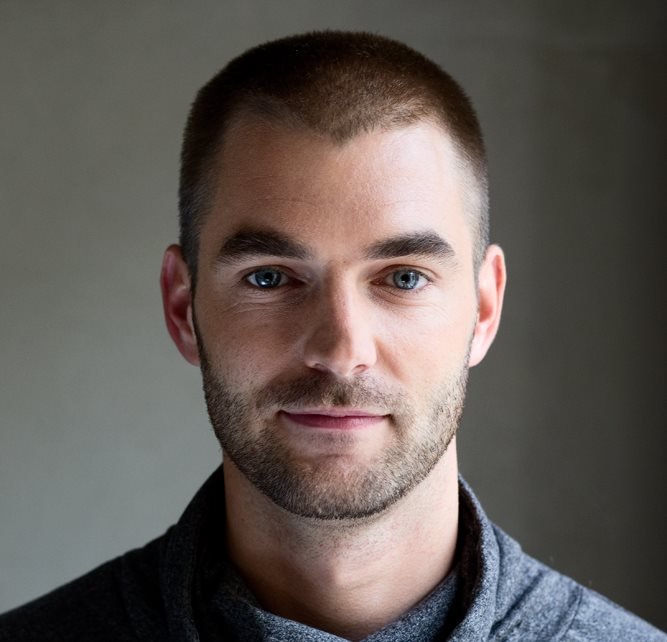
Putting a face to the name: Lukasz Kukowski, Senior PR Manager at GOG.com
So, a lot of people already know, but it could be cool to have in your own words a quick rundown of how you guys started out as Good Old Games and then moved to GOG.com.
Lukasz: Sure. So GOG.com started as Good Old Games, a platform for classic PC games because the owners of CD Projekt, who are the owners of GOG, they came up with the idea that the old games were not really available out there for people other than on abandonware sites.
They really loved and enjoyed games like Planescape: Torment, Baldur’s Gate and Fallout, so basically they came up with the idea to bring those great classics back, but also with a little twist: to have those games DRM free. This was definitely something new back in 2008 when GOG started. They also wanted to have plenty of additional bundled content such as wallpapers, soundtracks, artbooks and whatever else we could find. Thus we made a digital version of the game into a full pack with the kinds of things you’d see in a Collector’s Edition. Last but not least, we needed to make all those games work on modern operating systems, so games from the DOS or early Windows eras were made to run flawlessly on new Windows machines.
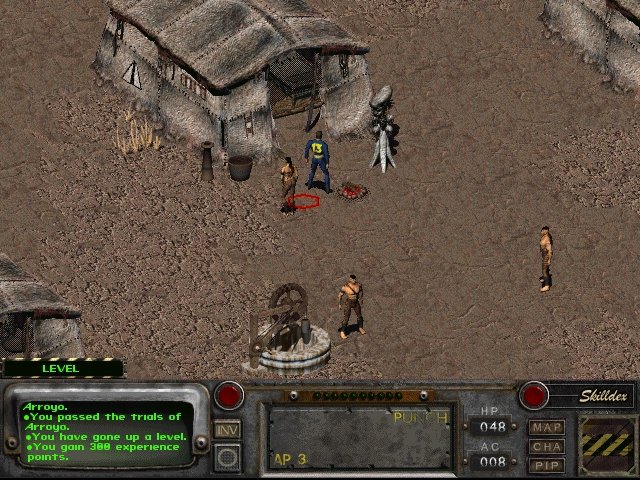
Good Old Games set the bar high by having Fallout 1 & 2 available right out of the gates.
That’s where it all started, and it was as a result of our experiences on the Polish market. CD Project began distribution of games in Poland back in the early 90s, and our main competition wasn’t other distributors… instead, it was the pirates. In the 1980s in Poland there was no such thing as ownership of media – no ownership of music or movies, nothing like that. Nothing was owned by the companies which made that content. It was… ‘freely available’, let’s say!
So pirates were making plenty of money off games, music and movies, and then in the beginning of the 90s it all started to change. We had new laws introduced that meant companies were actually able to earn money off what they made or distributed. And like I said, the biggest issue for companies doing this, such as CD Projeckt, was the pirates. They decided to fight the pirates – but not with sticks, but with carrots. What I mean is they started to localize the games into Polish, adding bonus content so that when you bought the original you’d receive a really nice box with stuff like artbooks, soundtracks etc. These were the things that added value to the purchase, and you couldn’t get these when you bought a simple CD in an envelope from a pirate.
That was the idea how GOG wanted to fight with abandonware which was really big at the time. You actually could access those games through abandonware sites, but you didn’t know if the game you’re downloading is what you thought it was. It could easily have been a virus, or it wouldn’t run on your computer – these were the kinds of issues gamers faced back in the day.
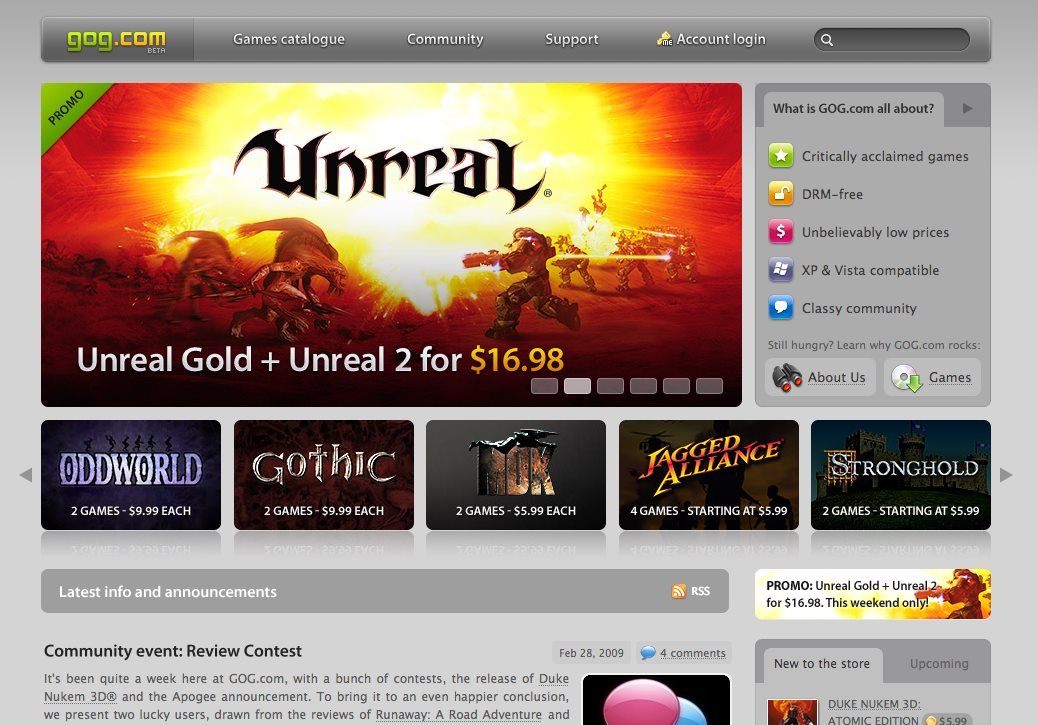
Who of you remember when it looked like this? Good Old Games’ front page from some nine years ago. (View a screenshot of the full page from 2009)
So we started with classic games because that was the first idea of how we would be a bit different to anything else on the market. In 2008, Steam was already on the market and it was getting bigger and bigger, so we figured we’d choose our own path and take an alternative, DRM-free approach. That was something that really brought us into the spotlight because a lot of people were like, “wow, you can actually do digital distribution without DRM”.
It was clear that if you packaged it well, people were willing to pay money for what they could just download illegally for free somewhere else.
Lukasz: Exactly. We showed that if you put your games online without DRM, it wasn’t going to kill your sales. We received a lot of praise from the gaming community for what we did back then, and we started to develop the idea farther. We added more and more classics to the catalogue, and within a few years we decided to drop the “Good Old Games” name and move to GOG.com.
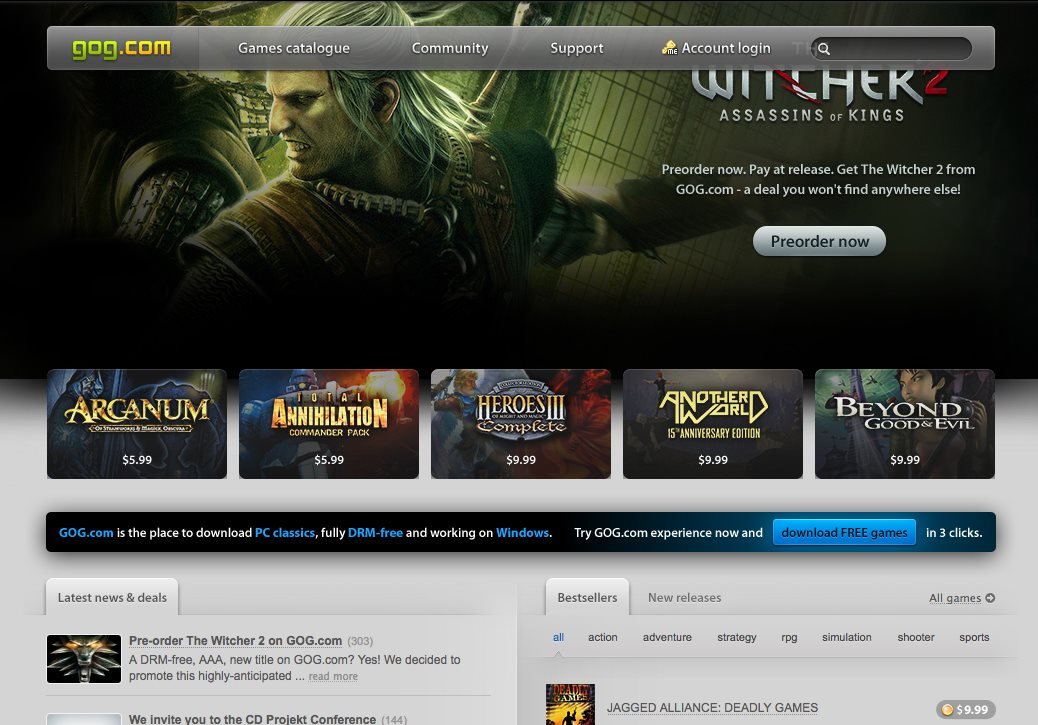
The GOG.com home page as it appeared in 2010. (View a screenshot of the full page from 2010)
Why the change? Was it just good business? I mean, was it a necessary move, or did you guys just recognize that you had a business opportunity by broadening your offerings to include new titles as well?
Lukasz: It was actually everything! (laughs) We saw that there was an opportunity for us to develop the platform. We didn’t want to stay with the classics only because we felt like people would actually enjoy the platform itself – how we approach digital distribution. We found that plenty of our partners were actually eager to release their newer titles in this business model, so we figured why not. We still have a list of great classics that we want to bring back, and we’re going to keep on with that side of the business.
We’re still approaching the old titles and trying to figure out who owns the rights to which games, who can we actually sign with to bring those classics back and so on. We felt like we brought the core of the classic PC gaming to GOG already, but we still need more content for people. So, we decided to go broader and bring in more titles and more price points.

Bullfrog’s popular hit Syndicate Plus was added to GOG in early 2012.
We felt like other platforms, in particular Steam, are getting flooded with all the new games that come out. When you want to search for a new game but you don’t have a specific title in mind, you can be a bit overwhelmed by all the new titles and all the early access games. Our approach is not to have every game that comes out, but rather to curate the process. We handpick the games we like and we feel that our community will enjoy. So, our goal is that if you come over to GOG and don’t have a specific title in mind, but want to play, say, a strategy game, we’re pretty sure that whatever you pick from our strategy games catalogue, you will enjoy it. That’s how we want to do digital distribution. But still, this year we managed to cross our milestone of 2,000 games in the catalogue. It’s a really nice selection and you can definitely find something there.
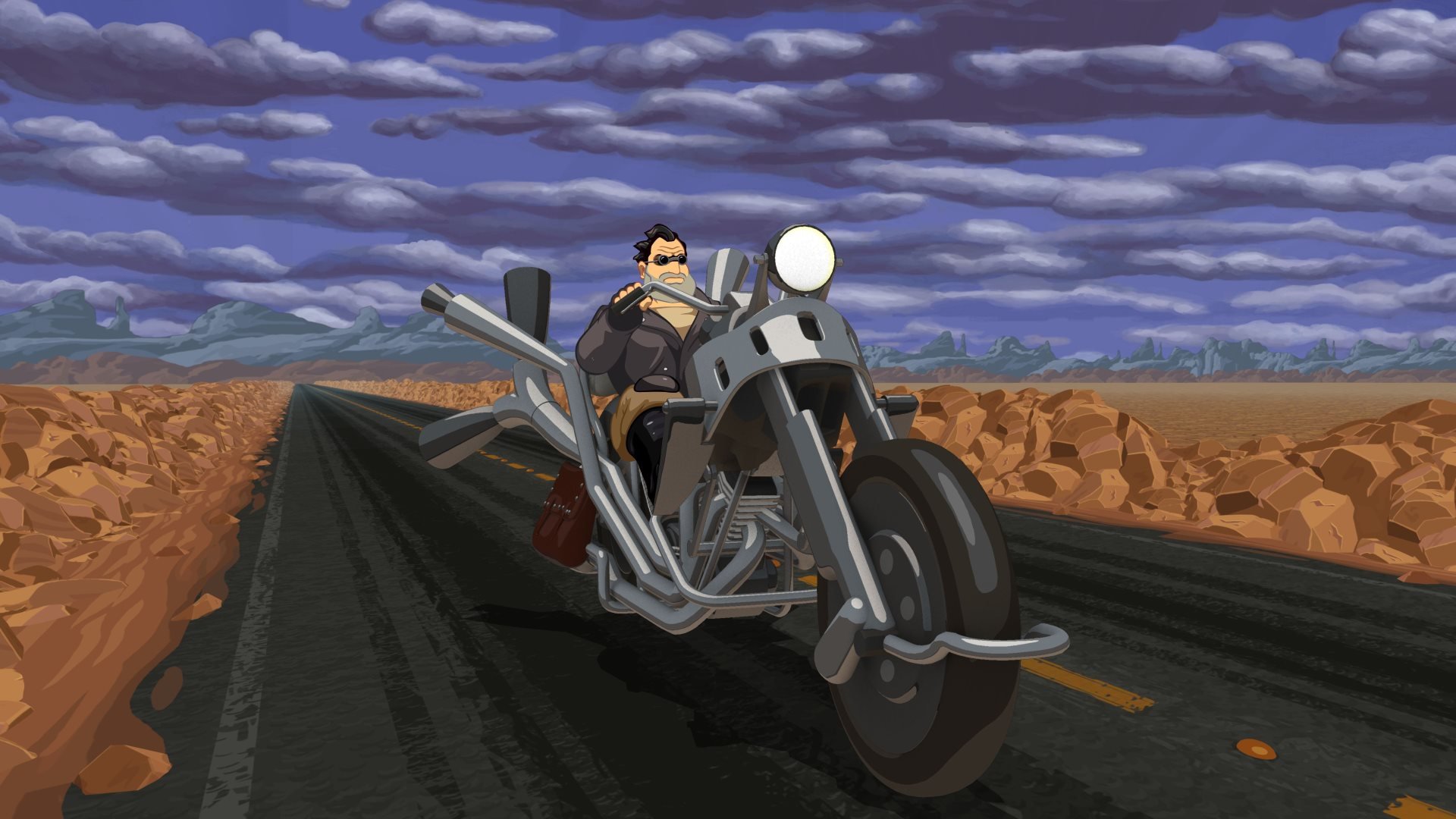
On top of classic titles and new releases, GOG has also seen excellent remakes such as Double Fine’s Full Throttle Remasters.
I remember, because I was when Good Old Games opened, how small you guys started but today have grown to be arguably the number one alternative to Steam.
Lukasz: Yes, that’s how we like to see ourselves – like an alternative way for gamers to play and explore new games. We are the second biggest digital distribution platform out there, and of course Steam is way, way ahead of us but still we’re working on this and every week we have a few new releases, so the catalogue is getting bigger and bigger.
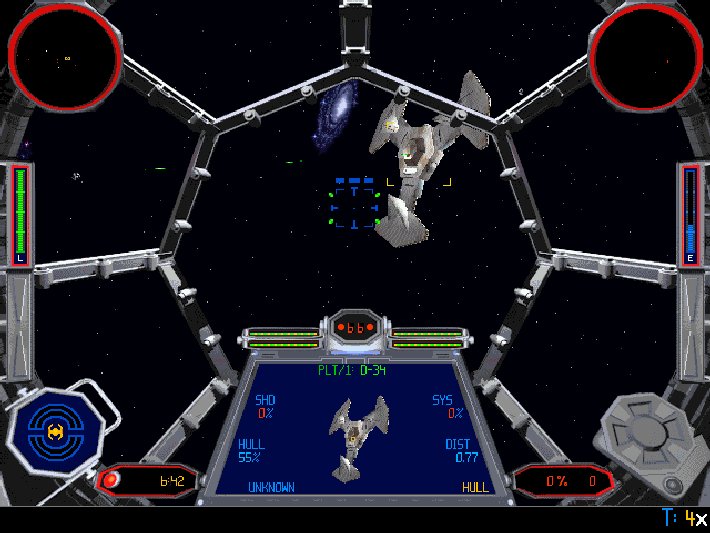
Arguably PC gaming’s most popular Star Wars titles of the 90s, the X-Wing and Tie Fighter games can now be played on modern systems.
And you’ve developed your own client: GOG Galaxy. What was behind that move?
Lukasz: Well, we’ve developed the client to manage your library, auto-update your games, to chat to your friends, to play multiplayer, even cross-play between Steam and GOG. We have achievements, we have time tracking, and now we have cloud saves, even for the classic games that never had those. We offer cloud saves for Planescape: Torment, for example, which was released when the cloud wasn’t even a thing. And the GOG Galaxy client is completely optional, which keeps with the premise of being DRM-free. You can still download the games directly from the website if you want.
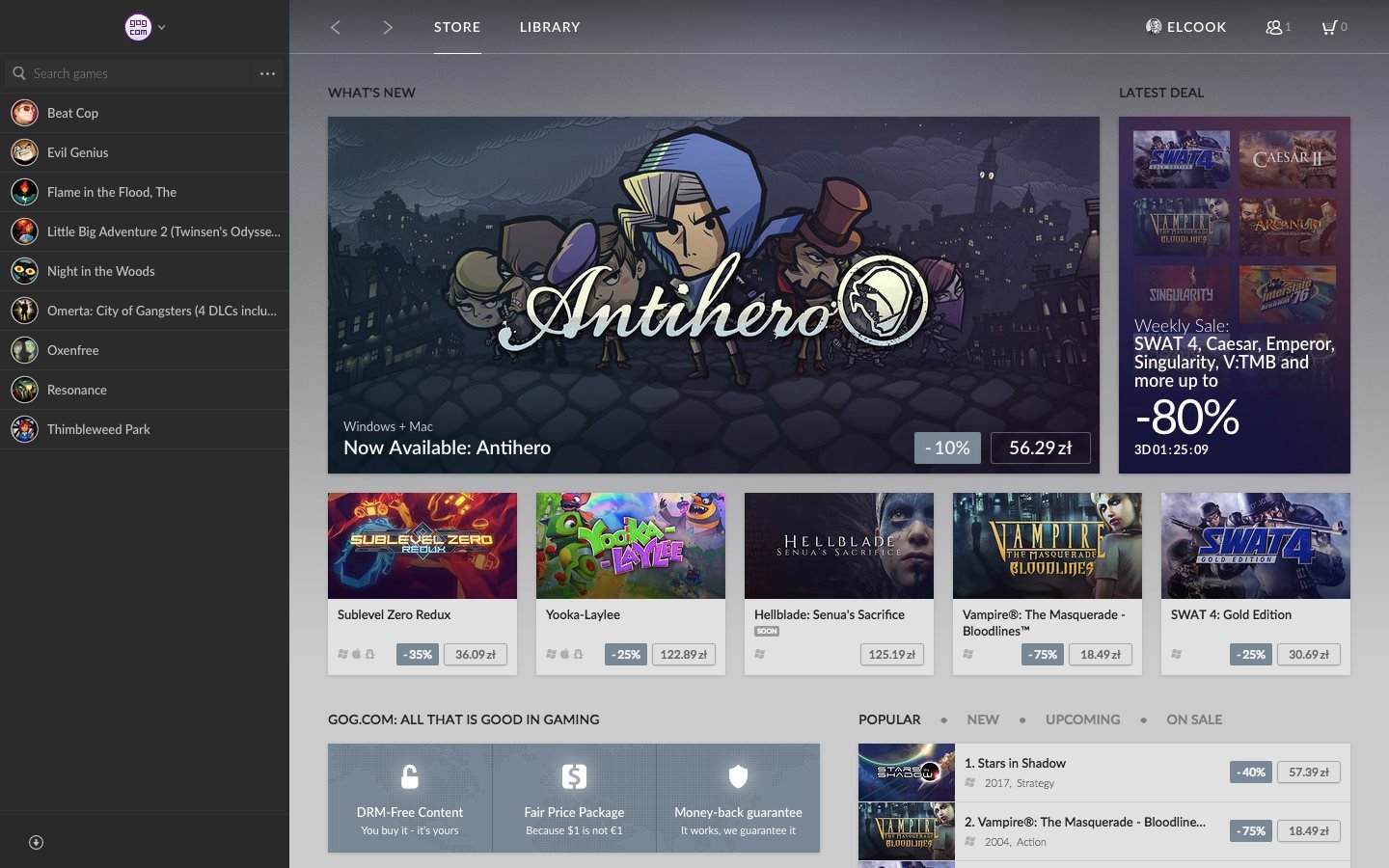
The Galaxy client is a convenient but entirely optional way to manage your GOG collection.
In April of this year we moved the client out of beta and into an actual release, and we’re continuing to work on it. The GOG Galaxy team is one of the largest in the company right now, and they’re working on improving it with more social aspects, such as giving you the ability to connect with friends. But that’s something we’ll be revealing more of in the coming months.
The other thing I can say now is that Galaxy is closely connected to Gwent, the new game from CD Projekt Red. It’s a standalone, free-to-play Witcher card game, and this is the first project where we’re working closely with the studio in this way. With the previous games, we were only involved in getting them distributed via the store. With Gwent, we have part of the GOG team handling all of the back-end stuff such as matchmaking and other multiplayer components.

The Might and Magic franchise is alive and well on the platform. This is strategy-RPG hybrid Heroes III.
So, one of the biggest feathers in your cap was that you guys had Fallout 1 & 2 from the beginning. How did you secure that license at the time, when you were basically saying “hey, let us sell your old games. There’s a market for DRM-free, and you’re not going to regret it!” – how did you convince them of that?
Lukasz: Interplay was one of the first publishers we had on GOG, along with Codemasters. That was the biggest thing for us when we launched – having Fallout on day one for launch. The funny thing is that CD Projekt was already the distributor for Interplay games, including Fallout, so we had already established a relationship with them. We really did a great job with the boxed version of Fallout here in Poland. The sales were pretty impressive for what was a new, emerging market back then.
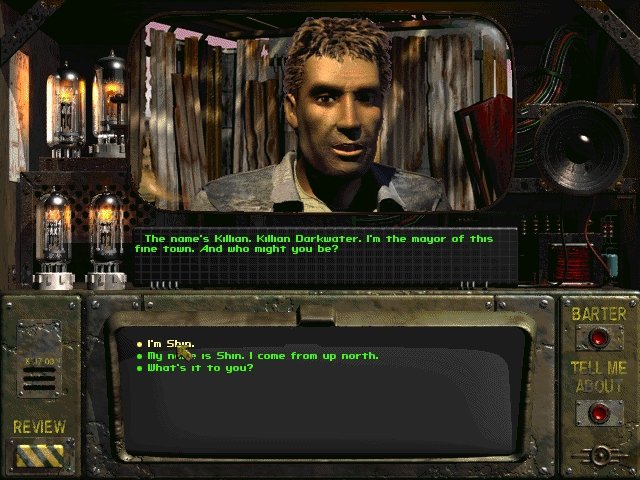
Fallout: Popular in Poland, a favorite here on Steemit, and a great launch title for Good Old Games.
Marcin Iwiński, who is the co-creator of CD Projekt and GOG, was in touch with Interplay and pitched the idea. He managed to get them on board mainly because of the good relationship with them, and they liked the idea of Good Old Games. They saw an opportunity to monetize the games that were no longer on the market. Of course, they didn’t know how it was going to end up with the DRM-free approach – whether it was going to be pirated all over the place – but we managed to convince them and they were happy to hop on board from day 1. I guess they were happy with the reception and the numbers, as it didn’t actually kill the franchise or their sales! (laughs) Everything turned out pretty good for all of us.
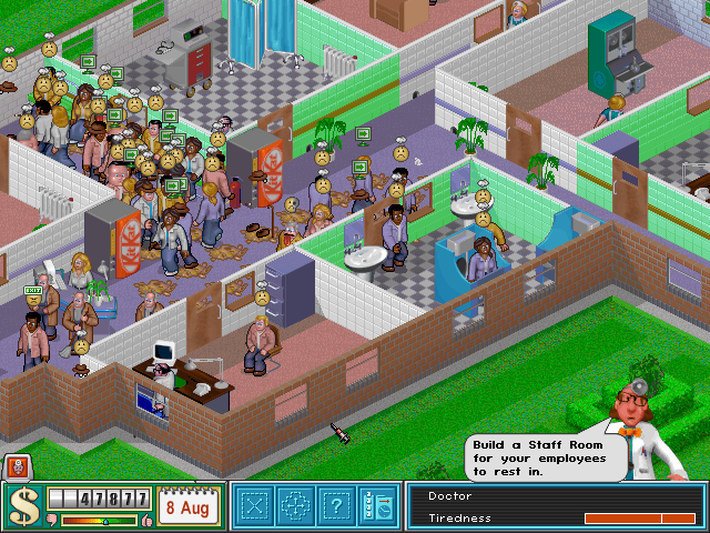
Until its release on GOG.com, Theme Hospital was notoriously difficult to run on newer versions of Windows.
Now do you get people actually approaching you with their old titles, or is it still a matter of seeking out games that you have in mind?
Lukasz: It’s both. Some of the companies or people that own the rights are approaching us because of what GOG has done in terms of reviving classic games. But in most cases it’s actually our bizdev department doing detective work, basically, trying to find the rights owners, because in many case those people don’t know that they own those rights, funnily enough. In many cases it’s us approaching companies and saying, “hey, we know that you have the rights because we did our research, but you need to dig through the archive and get the agreement and documentation for it”. This is the main issue, as the big companies often don’t have people or time to get that paperwork done.
There are plenty of funny stories around this. I can’t remember the exact title, but I recall one instance where the guy who owned the rights to the game, he moved away from gaming years ago. He was a gardener and really didn’t expect anything from the gaming past he had, so while he owned the rights to his game, he’d forgotten about it. We approached him and he was so happy because developers for those old games often feel like those old titles they worked on are, in a way, their children, so they really are happy if someone is willing to get and revive those games. Oftentimes when our team approaches them, those developers are long away from the gaming industry and don’t even know about the opportunities they have with GOG.
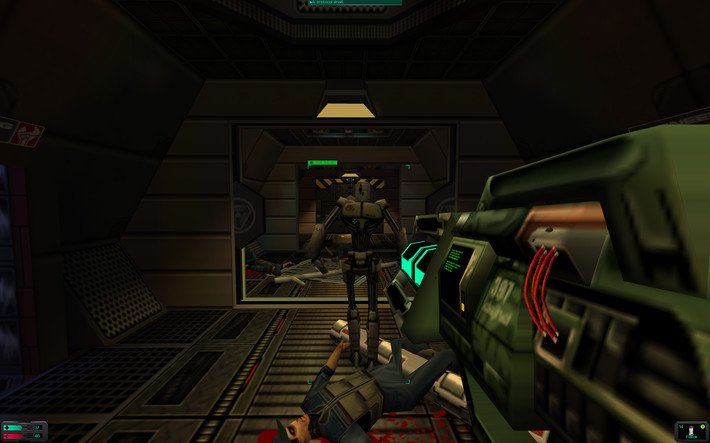
Added to the catalogue in 2013, System Shock 2 was the community’s most highly requested game and a perfect example of the team’s great detective work.
Sounds great – a team of videogame detectives!
Lukasz: Yes, we sort of see them as detectives and archeologists, preserving old games from the past and saving them from oblivion. That’s how we do it!
Awesome. Well thanks a lot, appreciate you giving me the history of how you guys got to where you are today. Appreciate it, Lukasz.
Lukasz: Thank you very much.
Come back tomorrow for second part of this interview, in which I talk to Lukasz about how he got involved in PR, what it takes to be a PR manager in the games industry, and more. In the meantime, check out GOG.com for a free copy of Jotun Valhalla Edition (giveaway ends July 17, 4PM UTC). You can follow Lukasz on Twitter here.
Previous:
Interesting People #7: Josh Sawyer on Fallout: New Vegas
Next:
Interesting People #9: Lukasz Kukawski on working Public Relations in the games industry
